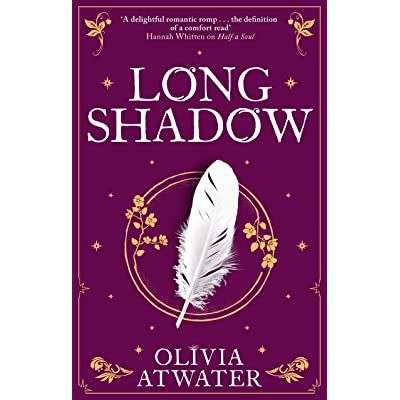LONGSHADOW by Olivia Atwater
Orbit p/b £8.99
Reviewed by Nigel Robert Wilson

Olivia Atwater has done herself proud with this tale. She has brought in most of the main characters of Half a Soul and Ten Thousand Stitches to create a tangled tale of the interactions between the separations and commonalities that beset faerie and human presences.
It appears that the souls of young gentlewomen are being abducted by a faerie sub-species called the sluagh and delivered to the Other Side because they have left their bedroom windows open to the west. The word sluagh is obviously Gaelic and means multitude. Outwardly this has no faerie resonance until the full context of `sluagh-na-marbh’ is revealed, meaning the multitude of the unforgiven dead. The precise context is a reference to the unshriven dead and originates with those slain in battle. Its origin must lie in the sense of desolation that pervades any place immediately after a person dies unexpectedly.
Given that mainstream British faerie belief, being severely curtailed by the predestinarian culture inculcated during the latter phases of the Reformation has no need to differentiate between the unshriven and those blessed before their passing to the Other Side. Funnily enough, it is at this very point that the story really begins.
Ignorant of the role of the sluagh, our hero Abigail, the adopted daughter of Elias Wilder, the Lord Sorcier, and an associate of the Hollowvale faerie clan, accompanied by her delightful ghost-friend Hugh, sets out to discover how Lucy Pinckney, another young woman she had met when she came out into Regency London society, had died so suddenly. Whilst investigating this tragic event, Abigail discovers a young sluagh, Mercy Midnight, doing much the same thing as herself. Mercy, however, is enquiring into the disappearance of two other sluagh who appeared to have been kidnapped by a black magician. Abigail quickly learns that the sluagh are not killers but psycho-pomps – spirits who traditionally accompany the dying to their destination on the Other Side.
These two young women set out together on an adventure of discovery not just of faerie lore but also of themselves. This is why this tale is described by the publisher as a queer faerie tale. This love interest is marginal to the telling of the actual tale but essential to its conclusion. It is sweet, innocent and quite compelling. None of us knows with whom we will fall in love and how that relationship either sustains or consumes us. This one is a sustainer!
Part of the tale is set around Kensington Gardens. This reviewer had a great-grandfather who was a gardener there late in Victoria’s reign, and his sons called him Old Nick. There has to be something in the water around there. There is a fascinating episode where Abigail and Mercy are entrapped by iron horseshoes, but the delightfully articulated child ghost Hugh escapes to get help. At this point, the big guns turn up in the form of the Lord Sorcier and Dora, his wife, to give Abigail the support she desperately needs. The presence of Mercy Midnight creates tension, but Elias is prepared to learn from his daughter about the role and purpose of the sluagh.
A trap is then set to identify the black magician holding the two sluagh and find out where the elusive Lord Longshadow, the head of the sluagh clan, could be found. This is the final denouement of the entire tale and is deliciously messy. It is a little disappointing at such a late stage of the story that another character is introduced to fulfil this role, but by then, the book has become a real page-turner.
This is a good story with a challenging conclusion. It introduces new concepts to faerie and further good characters to build on. The shape-shifting Lord Longshadow is more than just a challenge! The sluagh called Black Catastrophe, invoked by Abigail on a couple of occasions, is a brilliant addition to the cast. As well as drawing us into same-sex love, Atwater touches on racial discrimination and the falsehoods that underpin it. Thoroughly good entertainment!

